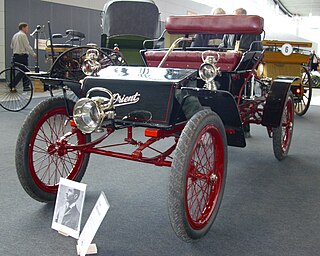
A motorcycle, often called a bike, motorbike, or cycle, is a two- or three-wheeled motor vehicle. Motorcycle design varies greatly to suit a range of different purposes: long distance travel, commuting, cruising, sport including racing, and off-road riding. Motorcycling is riding a motorcycle and related social activity such as joining a motorcycle club and attending motorcycle rallies.

An antique car is an automobile that is an antique. Narrower definitions vary based on how old a car must be to qualify. The Antique Automobile Club of America defines an antique car as over 25 years of age. However, the legal definitions for the purpose of antique vehicle registration vary widely. The antique car era includes the Veteran era, the Brass era, and the Vintage era, which range from the beginning of the automobile up to the 1930s. Later cars are often described as classic cars. In original or originally restored condition antiques are very valuable and are usually either protected and stored or exhibited in car shows but are very rarely driven.

The Brass Era is an American term for the early period of automotive manufacturing, named for the prominent brass fittings used during this time for such things as lights and radiators. It is generally considered to encompass 1896 through 1915, a time when these vehicles were often referred to as horseless carriages.

De Dion-Bouton was a French automobile manufacturer and railcar manufacturer operating from 1883 to 1953. The company was founded by the Marquis Jules-Albert de Dion, Georges Bouton, and Bouton's brother-in-law Charles Trépardoux.

A steam car is a car (automobile) powered by a steam engine. A steam engine is an external combustion engine (ECE) where the fuel is combusted away from the engine, as opposed to an internal combustion engine (ICE) where the fuel is combusted within the engine. ECEs have a lower thermal efficiency, but it is easier to regulate carbon monoxide production.

Waltham Manufacturing Company (WMC) was a manufacturer of bicycles, motorcycles, motorized tricycles and quadricycles, buckboards, and automobiles in Waltham, Massachusetts. It sold products under the brand names Orient, Waltham, and Waltham-Orient. The company was founded in 1893, moving to self-propelled vehicles after 1898.

Gaeth was an American steam automobile manufactured in Cleveland, Ohio from 1902 until 1911.
The Shawmobile was a small two-seat buckboard-type vehicle from the horseless carriage era powered by a front-mounted gasoline engine with belt drive to the rear wheels. Wheels are of the wire bicycle type.
The history of the motorcycle begins in the second half of the 19th century. Motorcycles are descended from the "safety bicycle," a bicycle with front and rear wheels of the same size and a pedal crank mechanism to drive the rear wheel. Despite some early landmarks in its development, the motorcycle lacks a rigid pedigree that can be traced back to a single idea or machine. Instead, the idea seems to have occurred to numerous engineers and inventors around Europe at around the same time.

The history of steam road vehicles comprises the development of vehicles powered by a steam engine for use on land and independent of rails, whether for conventional road use, such as the steam car and steam waggon, or for agricultural or heavy haulage work, such as the traction engine.
The Metz Company was a pioneer brass era automobile maker established by Charles Herman Metz in Waltham, Massachusetts, from ca.1908 to 1922.

Christ Church is a historic Episcopal church at 750 Main Street in Waltham, Massachusetts. The church is a parish of the Episcopal Diocese of Massachusetts, and was named to the National Register of Historic Places in 1989.

Royal Page Davidson was an American educator and inventor.

The Waltham Steam was an American steam car.

The Roper steam velocipede was a steam-powered velocipede built by inventor Sylvester H. Roper of Roxbury, Boston, Massachusetts, United States sometime from 1867–1869. It is one of three machines which have been called the first motorcycle, along with the Michaux-Perreaux steam velocipede, also dated 1867–1869, and the 1885 Daimler Reitwagen. Historians disagree over whether the Roper or the Michaux-Perreaux came first. Though the Reitwagen came many years later than the two steam cycles, it is often, perhaps most often, known as the "first motorcycle" because there is doubt by some experts that a steam cycle meets the definition of a motorcycle.

The American Star Bicycle was invented in 1880 by G. W. Pressey and manufactured by the H. B. Smith Machine Company in Smithville, Burlington County, New Jersey. It was characterized by a small wheel in front to avoid the problem of tipping forward inherent in other high wheelers. A Star bicycle was photographed being ridden down the steps in front of the United States Capitol in 1885 to demonstrate its longitudinal stability, and Star bicycles were used for the sport of bicycle polo in the mid-1880s. Pressey sued Smith in 1887 for royalties. The name "Star" was attributed to the double star arrangement of the spokes.

Overman Wheel Company was an early bicycle manufacturing company in Chicopee Falls, Massachusetts from 1882 to 1900. It was known for bicycles of higher quality and lower weight than other bicycles of its time. Despite a nationwide bicycle craze in the late 1800s, the company was undercut by lower-priced competition, nearly went bankrupt in 1897, and never recovered from an 1899 fire. The company was sold in 1900.
















